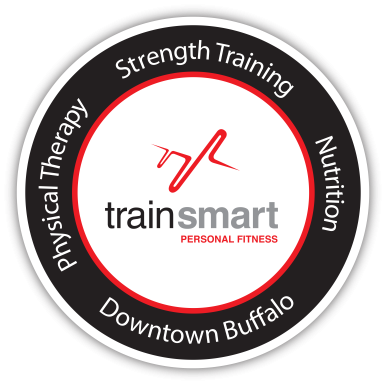Noah, one of our SUNY University at Buffalo Exercise Science Practicum students, reflects on the Spring 2024 semester internship with TrainSMART Personal Fitness. Here is what he has to say:
All righty. So, my three reasons for why TrainSMART is different from other practicums. Number one would be the guest speaker series. I don't think that's something other people do. Or at least they're definitely not having, I would say I think I can barely say the quality of people but also just the amount of people from CrossFit to MDs, which was probably my favorite. I really liked talking with Mike Geraci, I found his MAT-7 assessment was really useful. I think that even if you're going to some other internship, and they're having you do washing tables, and whatnot, but maybe if you pick up a couple of tests, I found even just my one talk with him really useful of connecting a lot of different neuro information with a lot of these tests that will figure out where on a joint the issue is coming from. And I know that's vague. But what I mean by that, is we did some tests, like the Yocum or Hawking tests, or shoulder impingement, that help you figure out where, on the shoulder joint glenohumeral joint, you're actually having the impingement occur. And that was really cool. And it made you think, and that was really enjoyable. And also we had Joe Lorenzetti come in from, who's specializes in McKenzie MDT stuff. And that was really cool to sort of learn about the derangement versus dysfunction. So derangement is when you get a movement practice, or they call it a directional preference, where, depending on where the pain is coming from, you're going to have a preference to move away from it, and have a position that's comfortable, and then therefore position that's uncomfortable. And then dysfunction is when you have bad tissue, or an actual damage to tissue. So derangement is why it's called Mechanical Diagnostic Therapy, because they are believing that the issue is coming from something moving out of alignment, that through exercise or through manual therapy could be moved back and that would alleviate your pain. Alright, number two is the weekly curriculum. From McGill, Liebenson, Gray Cook, Perform Better, you know, I don't think you're gonna have access to these videos or know they exist, because Perform Better is a free resource. That I had known Perform Better conferences existed, but I had no idea that material was out there. So I really appreciated that. My favorite one was probably the series from, I think it was 2020 week 2, the fascial branding stuff that was really cool. I think we do a lot of skeletal muscle stuff. But it was really cool to learn about connective tissue training. Alright, three, ability to apply what you've learned to your coaching. So I think a lot of times people are thrown into the fire, which is great for its own merit, but to actually have new skills you're applying is a whole lot more useful. Because it lets you be more adaptable, but also know what to look for, and have tools to understand why something's going wrong, and have new cues to be able to target those specific issues. So those would be the three things I took away. Five things I learned. Number one, we're really stressing that you're getting is that the core is not just your rec, abs, your six pack. It's your whole trunk, which includes your glutes, glutes, glutes, glutes. And I think that's important, because number two, also, I guess for core we really focused on how it's managing intrabdominal pressure between your diaphragm and your kegel muscles. Anyway, okay, so number two here, many people fail to perform a squat and a deadlift because of their lack of kinesthetic awareness. Instead of moving at their hips, they're moving at their low back. And so a lot of what we can do as coaches is sort of introduce and help teach them how to move at their hips, rather than moving at their back because, also for two here, loaded spinal flexion is a source of injury, and even disc herniation with lots of load or cumulative loads. Number three, the value of functional strength training I think those are you got to do is look up Sam Sulek or find someone else who's 20 year old, you know, blasting PEDs. And you'll see how there's a huge orthopedic cost to doing a lot of bodybuilding stuff. And it's very popular, especially with young people. And once you're doing these Olympic power lifts, whatever, you know, for competition, or, you know, are good at that competition, you know, is it really worth it? Probably not. And I think that was really informative, especially for athletes. It's not how athletes train. And I think there's just sort of mind washing through different social media that makes it so popular nowadays. So going forward, functional strength training is something I'm going to be doing. Number four here, the Liebenson, MDT, Geraci, McGill screens, any FMS screen as well, help put people in uncomfortable positions so you can start to get a feel of where those issues are coming from. There's more tests afterwards you do to find out what could be causing that. But it's sort of red alert flags of, okay, we have an issue here. That can really help you as you're beginning to, after you take your questionnaire, sort of figure out where the issues are coming from. And how you're going to address that's going to depend on what the person's goals are, what they do. All right, number five, it was from one of these Perform Better videos. And it's the body it's a quote, it was all lecture series. But the quote is really cool. I like it. It's my favorite. It's "The body's a plant, not a machine." I think we get hammered with lots of things of, you know, the body's a machine and a well oiled machine. You know, got to fuel your jet, but you you are not, you know, a combustion engine. If you train like a bodybuilder, you'll be a combustion engine and you will break down. But unlike an engine, you can actually heal. You don't have new parts that get put in, that's not normal or natural. If you train correctly, and do things that you were designed to do, you can heal. And I think that that's a really important thing to tell people. Is that you can heal, and the body can heal itself, because a lot there's a lot of fatalistic thinking out there. And I think it's really important to realize that, you know, there are things that can be done. And that, you know, not, I know we've said it before a lot here, but not every guru knows everything, and that it's important to learn from different people and find different people who might have an answer, because there's a lot of information out there. So that's sort of what I've taken away. I mean, there's a whole lot more, but I'm very grateful for the opportunity to here. I could go on for another 10 minutes. But I think those were the huge things that I think separated me, you know, three, four months later now than when I walked in the door. Thank you.

